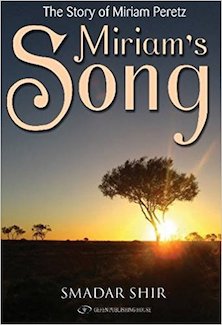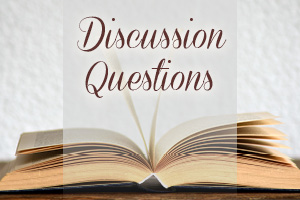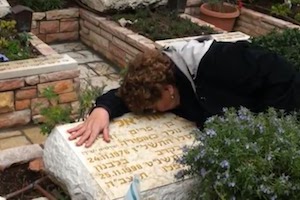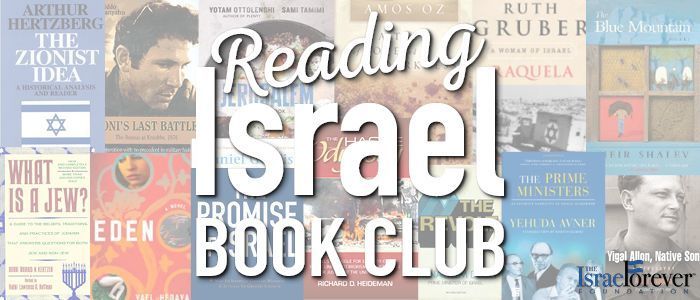Book Review of "Miriam’s Song"
Miriam’s Song depicts how one woman experienced unspeakable tragedies – the loss of two sons, Uriel and Eliraz, in Israel’s wars, as well as the death of her husband, Eliezer, to a broken heart. Yet Miriam courageously chooses to live a life of hope, while inspiring a nation, transforming her pain and grief into education and volunteer service, and visiting schools and military bases to share her son Uriel’s vision of leadership and transmit her “core messages of carrying on with life and strengthening others.” She offers her story of strength and resilience as an example of the verse from Proverbs 24:16 that “A righteous [wo]man may fall 7 times, yet rise again.”
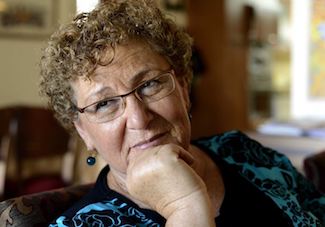
In sharing her lived experiences with the readers of this book, Miriam demonstrates how she has integrated her traumatic experiences and associated emotions into her story and is able to live with them in a productive way. While there is no closure, no sense of wholeness, she has been able to survive “the test of life through suffering given to me through the One on High,” move forward, and grow alongside the pain and grief of multiple losses. She does this, with a deep faith in God, and by following a path in which: “Every day you wake up, and the question is what do you do with your life, what meaning you put into it…. Every day I pick myself up by myself, to a new battle for existence.”
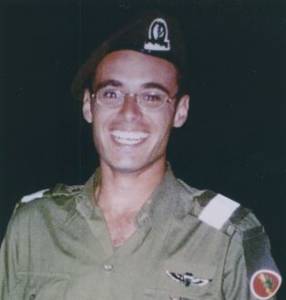
Uliel Peretz Z"L
Miriam’s Song starts with her early life, growing up with her family in Morocco, moving to Israel when she was ten, and living first in the Hatzerim Immigrant Camp and later in Be’er Sheva. It was here, from her parents, that she learned and developed her core beliefs and values of “giving and lovingkindness, [and] love for the land of Israel and the bible,” as well as her mother’s strength and the skills that fortified her in preparation for the future. The book continues with her meeting and marrying her beloved Eliezer, raising their six children – Uriel, Eliraz, Hadas, Avichai, Elyasaf, and Bat-El – “on patriotism, faith and love,” earning a university degree and becoming an educator and school principal, and surviving the deaths of Uriel, then Eliezer, and Eliraz.

Eliraz Peretz Z"L
Trauma does not only affect one person; it impacts the whole family. By bringing in the voices of her four surviving children, her daughter-in-law Shlomit, and five-year-old grandson Or-Chadash, we hear not only their anguish, but also how the whole family supported each other and strengthened each other, while each dealing with the tragedy in their own way. Elyasaf is not looking for a way to escape the pain, but writes “some poetry, some thoughts.” One of his musings is about the different recitations of the Shema prayer and its message of hope: “During the morning recitation … we say ‘emet v’yatziv’ (true and constant), but when we recite it in the evening we say ‘emet v’emunah’ (true and faithful) … In the daytime, by the light of the sun, things are clear and unwavering. But at night, when you can’t see, you need truth and faith. Hope. And words from the heart.” His sister, Bat-El, describes her “reality in which there are no answers, only two paths: the first is to refuse to accept, refuse to cope, throw away life, decay, and finally die. The second option is to cope … to get up in the morning, go back to school, feel it’s okay to be happy, let yourself cry when needed, stare reality in the eye and choose.” Bat-El chooses the second path. “I choose to keep believing in the One Who sits up there making the decisions. I choose to keep believing in life, in happiness, and in love.” Both have clearly learned from the example set by their mother.
Miriam’s spirit is strong; she is not broken. Her spirit “grows stronger and takes on new forms of giving and dedication, of connection to this land and our heritage. Out of the darkness that visited our family and many other families in Israel, every day I choose to spread light.” She tells all who pass by “Follow my light…. Together we can banish the darkness from our lives. We can spread the light through simple, humane acts that are free of self-interest, motivated by faith in the truth of this path, by responsibility, and by love for people and homeland. These are the lights that build a nation.” She closes by describing her goal: “To pass on [Uriel’s] torch to our wonderful youth: the flag that enfolds within its values of commitment, giving, responsibility, dedication, and love for others; the aspiration for excellence, love for our land and its landscapes; and, mainly, belief in the justness of this path.” As in the verse from Jeremiah 31:20, “For whenever I speak of him, I do remember him still,” Miriam is “like a walking tombstone for my two sons, but unlike the tombstone on the grave, I’m not silent, I’m a living, breathing memorial. I’m the tombstone of their lives. My path is to live them, with them.”
As I savored the book, there were pieces I wanted to highlight on almost every page – beautiful insights and lessons and attempts to answer the question of how did Miriam find the strength to survive? At least twice, for me personally, there appeared the words that synchronously resonated with what I had written in my posting A Good Day for God’s Hand – that things happen not by coincidence, but by God’s Hand. On the day that Miriam was to accompany her oldest grandchild, Or-Chadash, to his first day of school, Miriam was informed that the IDF had killed one of the members of the terrorist cell that had slain his father, Eliraz. She wondered: “Was this the hand of God, or merely a coincidence?” Five years later, while waiting to return home to Israel from New York in the aftermath of Hurricane Sandy, Miriam met an airline stewardess who shared with her how her life had changed when she read a book that had a powerful influence on her, unknowing that she was speaking to Miriam Peretz herself: “It’s about a woman who lost two sons. But it’s not tragic. Just the opposite – it says a lot about inspiration and faith.” While some people call such things ‘coincidence,’ Miriam’s term for such incidents is ‘the hand of God.’ “I believe that God has opened a window for me to meet new people … [to feel] inspired by God’s presence and love.”
In the past five years, Miriam has “learned to love people more than I did in the past. I’ve learned to listen, and I’ve adopted a positive outlook, choosing to view everything on the bright side. I’ve learned that there are so many stories that we don’t hear. Maybe it’s my role to lend a willing ear, and thus to give someone a moment of joy and hope.” She has learned the power of telling and listening to stories to heal and transform lives – her own, as well as others in her family, in the land that she loves so deeply, and around the world.

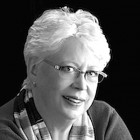
Zieva Dauber Konvisser, PhD, is a Fellow of the Institute for Social Innovation at Fielding Graduate University. Her research focuses on the human impact of traumatic events, such as terrorism, genocide, war, and wrongful conviction. She served on the National Commission on American Jewish Women and is currently on the international board of the Israel Center for the Treatment of Psychotrauma and the advisory board of Strength to Strength. She is the author of "Living Beyond Terrorism: Israeli Stories of Hope and Healing" (Gefen, 2014). The book can be ordered HERE.
Recommended:
READING ISRAEL BOOK CLUB
Get Started Reading Israel today!
About the Author


